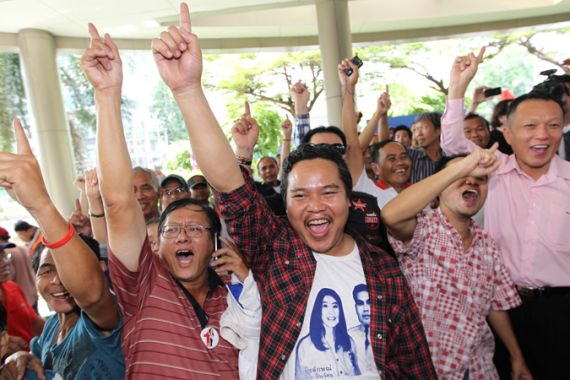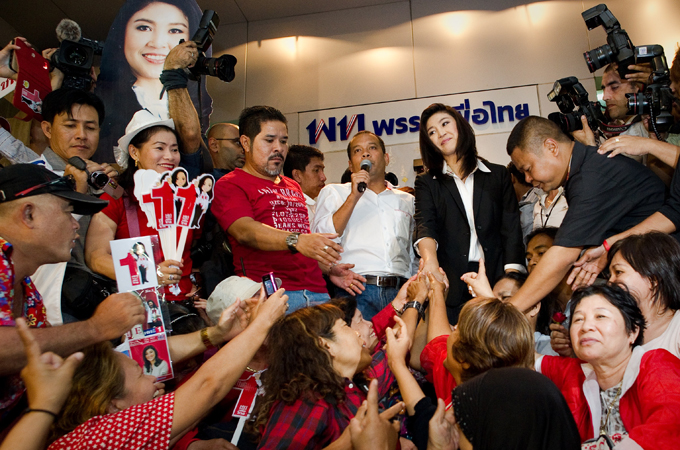Rural Thais roar to political forefront
The landslide victory of a young, female leader and her populist campaign could drastically alter the polarised nation.

 |
| A political novice at 44 years old, Yingluck Shinawatra proved to be a savy strategist at the helm of the red-shirted Phue Thai party which won 265 of 500 parliamentray seats [AFP] |
Across villages, towns, and cities in northeast Thailand, a mood of political empowerment is bursting to the surface, with people gathering in groups since Sunday evening to celebrate political history. After all, they helped put Yingluck Shinawatra on the road to becoming the country’s first female prime minister.
Under a starlit sky on July 3, election night, a group of villagers sat on mats outside a house in Baan Fang village on the outskirts of this plateau’s main city, Khon Kaen, basking in the victory of a candidate who “has given a lot of attention to the grassroots people,” as one of them, Paitoon Pohnang, described it.
As they listened to news reports that Yingluck’s opposition Phue Thai (For Thais) party was gaining seats, the group broke into whoops and applause, drowning out the chorus of crickets chirping from the darkened trees on the edge of the garden.
“I believe that a woman can be a prime minister in Thailand,” said an excited Sukunthai Buthawong, a 61-year-old rice farmer. “We have to try something new, not only voting for men to lead the country. I voted feeling this way. I want change. I want to make history.”
It was a sentiment echoed by the nearly 30 people gathered around her, men and women who were also part of the same community of rice farmers. “Women are good with details and work carefully,” added another farmer who was wearing a red shirt, the colour worn by Phue Thai supporters.
Rural vote
Celebrations were more vivid on Monday in the downtown market selling fresh produce in Khon Kaen, 24 kilometers from Baan Fang. Women wearing red shirts, some wearing red bows on their heads, were dancing to the blare of local music in their stalls of vegetables and meats. “I am happy and crazy. It feels better than winning a lottery,” yelled a vegetable vendor who only gave her first name, Ratree.
 |
“Rural people got involved with politics more than before,” said a calmer Phrapapai Pongpan, a fish vendor. “They were pushed out of home to go and vote after seeing the injustice in the last few years.”
And the final tally from the 20 provinces in the northeast, a large vote bank of over 15 million voters of the registered 47.3 million across the country, confirmed this. Phue Thai secured a thumping 104 seats out of the 126 contested in this rural heartland.
In all, unofficial results on Monday revealed that Phue Thai had garnered a simple majority – 265 seats out of the 500 up for grabs. The incumbent Democrat Party, which had led a coalition government since December 2008, won only 159 seats.
The significance of the rural heartland in this weekend’s poll was not lost on Yingluck, an attractive, photogenic political novice, who had been a successful businesswoman until six weeks ago, when she was drafted as the surprise candidate to head the Phue Thai party. It was a choice shaped by the party’s patron, her eldest brother Thaksin Shinawatra, the former prime minister who was deposed by the military in a 2006 coup and has lived in exile to avoid a two-year jail term for corruption.
Power of women
During her political campaign, Yingluck appealed to the thousands who attended her party’s rallies to vote not only for Phue Thai’s raft of pro-poor policies but also to ensure that this Southeast Asian kingdom would get its first female premier.
“Do you want a woman prime minister to lead the country?” she asked a crowd of nearly 5,000 people who packed a field in the province of Ubon Ratchathani on her last swing through the region on the eve of Sunday’s poll.
“Yes!” the crowd roared back, with some women pumping their hands in the air.
She echoed a similar message during an interview before taking to the stage for a political rally in the province of Buri Ram. “My success will be the country’s success,” said Yingluck, who was sporting a white T-shirt on which was printed a cartoon image of her leaning against the numeral “1”, her party’s number for the polls.
“I can use my strength as a woman,” she continued. “Women are more compromising, and are more willing to talk with anyone and to meet everyone to make a united Thailand.”
There was no surprise in Yingluck’s efforts to court voters from Thailand’s urban and rural underclass, the country’s largest constituency pivotal for any political victory. It was a move taken from the political playbook of her brother, Thaksin, a former telecommunication tycoon who rose to power in 2001 and was re-elected in 2005 on the back of the widespread support he got for many pro-poor polices he implemented.
But even Phue Thai insiders did not expect Yingluck to electrify the Thaksin strongholds in the north and northeast when she was initially chosen by her Dubai-based brother as a “compromise candidate” to satisfy various factions within the party. Thaksin, in fact, introduced Yingluck as “my clone,” suggesting that she was going to be his carbon copy in the way she implements policies and runs the country.
“She proved much better than expected. Her style, her warmth and her sincerity touched many voters in ways that a male leader of Phue Thai would not have done,” said the highly placed insider who preferred not to be identified. “She had become a superstar by the end of the campaign.”
Yingluck’s route to national leadership is similar to the one travelled by other women from political dynasties across Asia, where the wives or daughters of male prime ministers or presidents were voted in to power due to family ties. It was so in the Philippines for Corazon Aquino, who was elected her country’s first woman president in 1986, and for Sirimavo Bandaranaike from Sri Lanka, whose election in 1960 made her not only her country’s but also the world’s first woman prime minister.
“We have had many Thai women in positions of power but till now not as the prime minister,” said Patcharin Tanjapatkul of the National Council of Women in Thailand, the largest women’s network in the country. “It is time for that to change.”
A version of this article first appeared on Inter Press Service news agency.